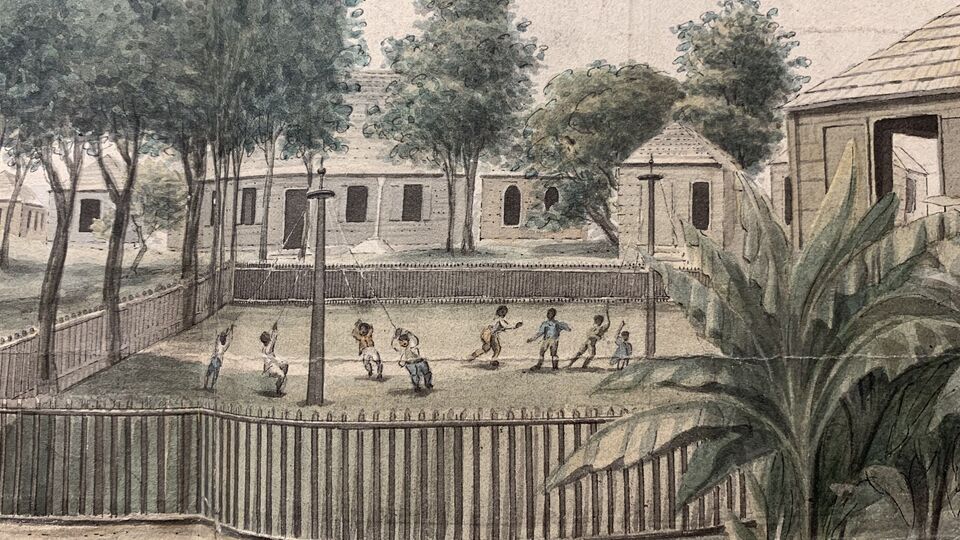Professor Jenny Hughes: The performance pedagogy of infant schools in British West Indies
Professor Jenny Hughes: The performance pedagogy of infant schools in British West Indies

Very little things are we,
Oh! How mild we all should be,
Never quarrel, never fight,
That would be a shocking sight,
And would break the happy rule
Of our much lov’d Infant School.
‘Song V’, in T. Bilby and R.B. Ridgeway. The Infant Teacher’s Assistant. (1834)
We may now train them up in what habits we please.
Edward Stanley (Earl of Derby & Secretary of State for War and the Colonies). ‘The debates in Parliament, session 1833, on the resolutions and bill for the abolition of slavery in the British colonies: with a copy of the act of Parliament’. (1834)
This presentation explores what must now be considered deeply problematic experiments in infant education taking place across the British colonies in the first half of the nineteenth century, and their place in the genealogies of applied and social theatre. Focusing on infant schools constructed in the ‘British West Indies’ following the Abolition of Slavery Act (1833), I examine the performance pedagogy at the core of these experiments - its embrace of play, song, games, movement, a theatrical use of space, and dialogic forms of instruction. Also present in radical education practice in Britain, this performance pedagogy was informed by Protestant culture, early socialist thinking, and Enlightenment ideals of autonomy, justice, and sympathy. Drawing on letters, journals and educational materials written by teachers involved in frontline delivery of the ‘infant system’, I present examples of this pedagogy in action, and consider its implications for understanding the histories of theatre as a social practice. Studies of applied and social theatre history have identified the field’s historical roots in late nineteenth and early twentieth century European modernist experiment, and this has arguably tended to result in an emphasis on theatre’s role in shaping an inclusive public realm and progressive social change. Selecting a performance experiment that supported the transition from an economy founded on enslaved labour to one founded on free labour as an alternative starting point, I try to answer Michel Foucault’s call (in his writing on genealogy), to formulate ‘a history of the present’, identifying the conditions shaping social conditions over time and from which contemporary challenges emerge. Responding to cultural anxieties about the ‘demoralised races’ created by white colonial violence, investment in infant education was characterised by white missionary educators as paying ‘a debt of justice’ to formerly enslaved peoples, but it was underpinned by ‘civilising’ imperatives and racialised conceptualisations of difference that had long-lasting, destructive impacts for local cultures. It is possible, also, to read archival sources in ways that reveal glimpses of how local children and teachers carved opportunities for critical forms of autonomy, creativity and self-determination within this colonised space.
Biography
Jenny Hughes is Professor in Drama at the University of Manchester, UK. Her work explores the intersections of theatre and performance, economic justice, and social change agendas. She has published on theatre and performance in relation to socio-economic inequity, activist performance, war and conflict, histories of welfare and civic culture, most recently in a co-authored article (with Gemma Edwards) ‘Asymmetries at play: Race, racism, and anti-racism in the archives of radical theatre-in-education’ RIDE: The Journal of Applied Theatre and Performance (2023) and co-authored book (with Helen Nicholson, Gemma Edwards and Cara Gray), Theatre in Towns (Routledge, 2022). She is currently working on a book on the histories of theatre as a social practice, Social Theatre: A History, 1834 – 1906.
Photo: View of Buxton Grove in the town of St John’s in the Island of Antigua, circa 1841. Courtesy of Bodleian Libraries, University of Oxford.
Location
Royal Central School of Speech and Drama
Eton Avenue
London
NW3 3HY
United Kingdom
